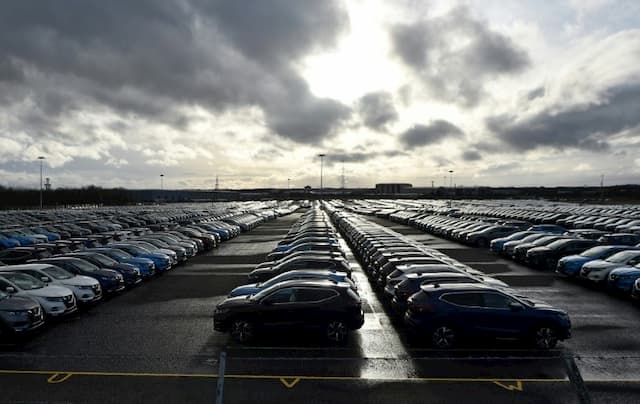Diesel, Petrol or Electric? When the Car Purchase Turns into a Puzzle

If the market for diesel vehicles collapses, that of petrol remains highly taxed, and that of the electric is still too expensive. This confuses many motorists for their next car purchase.
Diesel? Decried for its pollutant emissions. Petrol? Taxed for its CO2 emissions. Electric? Too expensive. Many motorists do not know which car to buy for their next car purchase, to the point of delaying their decision, even to give up, a trend that worries the sector.
In a Hyundai dealership in Chambourcy (Yvelines), a retiree scans several models, looking for a replacement to his SUV (4 × 4 leisure) diesel.
“Protecting our planet”
“I hesitate between electric or hybrid style vehicles or gasoline. I’m looking for my path, “explains Fring Noël. “I had a lot of diesel in my life, for me it was the ideal engine. But we must take care to protect our planet. ”
Les #SUV🚘 sont + lourds, + encombrants, + polluants et ont des “conséquences désastreuses” pour la 🌍, selon @JAlmosni chef du service #Transport & #Mobilité à l’@ademe. Retrouvez son intervention dans @le_Parisien 👇https://t.co/5pfEhVzutU
— ADEME (@ademe) October 25, 2019
The rigged engines scandal has highlighted the polluting discharges, fine particles and oxides of nitrogen, and discredited this technology. In Europe big cities, like Paris, have announced the progressive ban on diesel. The market has collapsed.
“Before it was simple, we had petrol or diesel, now we also have the hybrid (petrol-electric), the electric, the rechargeable hybrid …”, explains Quentin Barbier, head of sales in this concession Hyundai. “The customer knows what he wants as a car template, but he is in trouble to choose the engine. He asks many more questions. ”
Que ce soit au niveau national ou local, les élu·es doivent prendre leurs responsabilités et adopter les mesures qui protégeront la population des effets néfastes de la pollution de l’air. Comme sortir les voitures #diesel des villes, par exemple. Au hasard.#OnVeutRespirer pic.twitter.com/EndVgwIqu3
— Greenpeace France (@greenpeacefr) October 24, 2019
Petrol vehicles penalized by the malus
Diesel represents only one registration out of three in France, against three quarters at its peak in 2012. But gasoline-electric hybrids (5% of the market) and electric cars (2%), more expensive and unsuitable for all uses, struggling to take off. The postponements are therefore massively towards gasoline.
Problem: these engines consume more and emit more CO2, one of the main gases responsible for global warming. In France, they are also more often penalized by a “malus”, a purchase tax that will be increased on the 1st January to favour electrified vehicles.
“I decided to go for petrol for ecological reasons, but I was very surprised to see me impose an ecological penalty of 80 euros on my vehicle, while there were none on the diesel models of the same power. I think there are plenty of people who can not understand that, “says AFP Alain Codron, a retiree met in Orgeval (Yvelines) in a dealership Aramis Auto, a company selling new cars online or used.
#MalusAuto
“Si vous avez une 3008 vous paierez ce malus alors que votre voiture pollue moins qu’une Ferrari. Je ne suis pas sur que le poids du véhicule soit la mesure exacte de la pollution sur la route”
🎙️ @GDarmanin Min. de l’Action et des Comptes publics#BourdinDirect pic.twitter.com/54GO7QtLXs— RMC (@RMCinfo) October 14, 2019
“Motorists are lost”
Philippe Geffroy, president of Mazda France, denounces the complexity and incoherence of current public policies. “We hold an anti-diesel speech that kills the market and at the same time diesel is favoured by the bonus/malus system. People are lost, “says the manager who represents foreign manufacturers in France, as president of the passenger car branch of the International Chamber of Automobile and Motorcycle Trade (CSIAM).
Calling for “technological neutrality”, he is also surprised that the “Crit’Air” vignettes, which classify vehicles according to their pollutant emissions, better note “plug-in hybrid vehicles that are 2 tonnes and consume a lot” compared to diesel of the last generation, more virtuous according to him.
The market resists
Technological and regulatory complexities combine to plunge buyers into doubt. “There is a phenomenon of waiting. People say to themselves, ‘I do not know what to buy, so I do not change my car and I wait’. This is probably one of the explanations today to the decline of the European market, “said this summer Jacques Aschenbroich, boss of the equipment manufacturer Valeo, during a lunch with journalists.
At first glance, with 2.1 million registrations planned this year, the French car market seems to resist. “But when we go into the details of the figures, we realize that sales to businesses are pulling the market, while sales to individuals are down slightly,” said Flavien Neuvy, director of the Observatory Cetelem.
Quelles sont les tendances en 2019 du marché automobile électrique et hybride rechargeable ? Pour le savoir, cliquez juste ici : https://t.co/6G6jsMdkMn
— Arval France (@Arval_France) October 21, 2019
People are turning to the second-hand market
“Motorists are a bit lost and prefer to wait to see more clearly before changing their car,” says this expert. “One of the consequences is that they are turning more to the second-hand market.
Suddenly, the park is ageing and this is not good news, because older vehicles are also the most polluting.
Enjoyed this? Get the week’s top France stories
One email every Sunday. Unsubscribe anytime.


